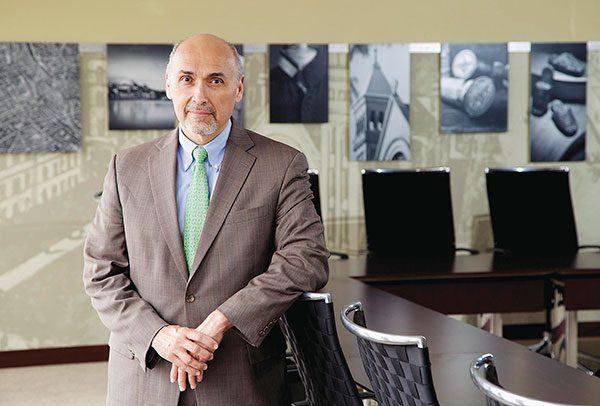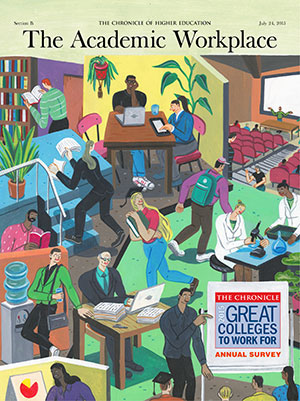Eighth Annual Survey
Great Colleges to Work For 2015
Roommate Tiff, Title IX Dispute: The General Counsel Sees It All
By Katherine Mangan

April Sumner
José Padilla says federal mandates and public pressure have complicated the job of general counsel at DePaul University over his 10 years in the post. Surviving these days, he says, “requires what I call a head on a swivel.”
On any given day, José D. Padilla and the seven lawyers he oversees at DePaul University might be dissecting the latest guidance from Washington to ensure that the university’s sexual-misconduct policies pass muster. On the same day they could also be monitoring “pay to play” litigation that, if successful, could require it to dole out more money to its athletes, and following up on a whistle-blower tip about a misuse of grant money. Meanwhile, contracts for a planned multimillion-dollar campus-events center in downtown Chicago might need scrutiny, and a student with roommate problems could be threatening to sue.
Surviving as a university general counsel these days, says Mr. Padilla, “requires what I call a head on a swivel.”
Federal mandates and public pressures have been piling on in recent years, requiring universities to update policies on such matters as sexual and alcohol abuse, privacy protections, and crime disclosures. At the same time, perennial concerns over academic freedom and tenure sometimes threaten to flare into lawsuits.
Mr. Padilla, who has been general counsel at the nation’s largest Roman Catholic university, with 24,000 students, since 2005, says each of his lawyers has a portfolio of topics he or she covers. Whenever possible, they try to mediate issues so DePaul won’t end up in court.
For instance, “I have a very aggressive employment lawyer who does a good job of working with university clients to stamp out the embers before they turn into full-fledged forest fires,” he says. But that isn’t always possible.
“We don’t get sued a lot, but people are lawyering up more and more these days,” Mr. Padilla says. Cases like student suspensions, which used to be handled as disciplinary issues, often escalate into his office. If a student has a dispute with a roommate and wants to change rooms but is locked into a dormitory contract with the university, it’s becoming more likely that “we’ll be getting a nastygram from an attorney.”
With stepped-up enforcement of the federal gender-equity law known as Title IX, a staff lawyer holds frequent meetings with administrators from departments that oversee housing, public safety, diversity, student affairs, and athletics to make sure everyone understands their compliance responsibilities.
And when it comes to hot-button issues like sexual assault, everyone wants to weigh in.
“The problem isn’t so much Washington as the echo effect it’s created in states and municipalities,” says Mr. Padilla, who previously worked as a lawyer and lobbyist for the Illinois Institute of Technology. He understands the political pressures, having also worked as a legislative assistant to the late Sen. Lloyd Bentsen, a Texas Democrat, and as an assistant commissioner in the Treasury Department during the Clinton administration.
Last year city officials in Chicago proposed an ordinance on campus sexual violence at the same time that the state’s attorney general was promoting legislation aimed at strengthening colleges’ responses to such incidents. The state bill, which would require colleges to offer extra training for students and employees, and to comply with stricter reporting procedures, has since been approved by the House and Senate and is awaiting the governor’s signature.
“When those things occur,” says Mr. Padilla, “they’re ripe for conflicting or duplicating, or otherwise just making compliance nightmares with respect to what’s happening in Washington.”
His office also fields questions that pertain to its Catholic mission, including whether it can stop the annual staging of The Vagina Monologues. The play raises money for groups combating violence against women, but its explicit content has prompted other Catholic colleges to call off productions. Mr. Padilla’s office has responded by saying that it respects the protesters’ views, but that a university should encourage “an honest and robust debate” about challenging issues.

- View: Academic Workplace 2015
Chronicle subscribers get access to the full Academic Workplace report. Not yet a subscriber? Sign up here.
We're sorry. Something went wrong.
We are unable to fully display the content of this page.
The most likely cause of this is a content blocker on your computer or network.
Please allow access to our site, and then refresh this page. You may then be asked to log in, create an account if you don't already have one, or subscribe.
If you continue to experience issues, please contact us at 202-466-1032 or help@chronicle.com


